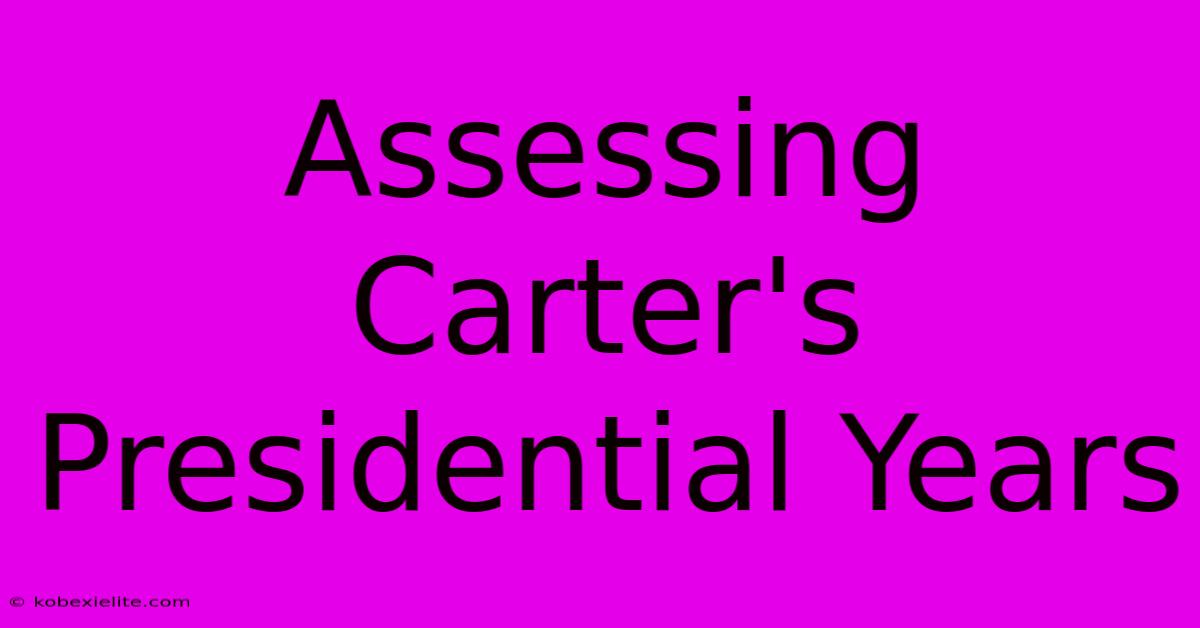Assessing Carter's Presidential Years

Discover more detailed and exciting information on our website. Click the link below to start your adventure: Visit Best Website mr.cleine.com. Don't miss out!
Table of Contents
Assessing Carter's Presidential Years: A Complex Legacy
Jimmy Carter's presidency (1977-1981) remains a subject of intense debate. Often viewed as a period of economic struggle and foreign policy challenges, a closer examination reveals a more nuanced and complex legacy. This article delves into the key aspects of his administration, exploring both its successes and failures, to offer a balanced assessment of his time in office.
The Domestic Scene: A Balancing Act
Carter inherited a nation grappling with significant economic woes, including high inflation and unemployment, a legacy of the Nixon and Ford administrations. His response was a multifaceted approach, attempting to balance economic growth with social justice.
Energy Policy and the Environment:
One of Carter's most significant achievements was his focus on energy independence. Faced with the 1979 energy crisis, he pushed for conservation measures and the development of alternative energy sources. The creation of the Department of Energy reflects this commitment. While these efforts weren't immediately transformative, they laid the groundwork for future progress in energy efficiency and renewable energy. His emphasis on environmental protection, including the creation of national monuments, also marked a significant shift in environmental policy.
Economic Struggles and Social Programs:
Carter's administration struggled to effectively combat stagflation. Despite attempts at fiscal restraint and deregulation, inflation remained stubbornly high, impacting ordinary Americans. His commitment to social programs, however, is undeniable. He championed human rights both domestically and internationally, reflecting his personal values and creating a lasting impact on social policy discussions.
Foreign Policy: Human Rights and Détente
Carter's foreign policy was characterized by a strong emphasis on human rights. He prioritized diplomacy and sought to resolve international conflicts peacefully.
The Panama Canal Treaties:
A major diplomatic success was the negotiation and ratification of the Panama Canal Treaties. This transfer of control of the canal to Panama demonstrated Carter's commitment to international cooperation and addressed a long-standing point of contention between the two nations.
The Camp David Accords:
Perhaps his most significant foreign policy achievement was brokering the Camp David Accords between Egypt and Israel in 1978. This landmark peace agreement earned Carter the Nobel Peace Prize and significantly reshaped the geopolitical landscape of the Middle East. This diplomatic triumph showcased Carter's skill as a mediator and his dedication to peaceful conflict resolution.
Iran Hostage Crisis:
Conversely, the Iran hostage crisis cast a long shadow over his presidency. The 444-day ordeal, which began in November 1979, damaged America's standing on the world stage and severely impacted Carter's approval ratings. The failure to secure the hostages' release before the end of his term is often cited as a significant failure.
Soviet Relations:
Carter's approach to the Soviet Union was complex. He pursued détente, seeking areas of cooperation while also maintaining a firm stance on human rights. The Soviet invasion of Afghanistan in 1979, however, led to a deterioration in relations and the end of détente. This highlights the challenges of navigating complex geopolitical realities.
A Legacy of Principle and Perseverance
Jimmy Carter's presidency was marked by both triumphs and setbacks. While he faced significant economic and foreign policy challenges, his unwavering commitment to human rights and peaceful conflict resolution shaped his legacy. His efforts in energy policy and environmental protection laid the foundation for future progress. Though often overshadowed by the Iran hostage crisis, the Camp David Accords and the Panama Canal Treaties stand as testaments to his diplomatic prowess and commitment to international cooperation. His post-presidency work on peace and humanitarian issues further cements his lasting impact on the world. Assessing Carter's presidency requires a balanced perspective, acknowledging both his achievements and the difficulties he faced. He remains a figure of significant historical interest, prompting ongoing debate and analysis of his complex and enduring legacy.

Thank you for visiting our website wich cover about Assessing Carter's Presidential Years. We hope the information provided has been useful to you. Feel free to contact us if you have any questions or need further assistance. See you next time and dont miss to bookmark.
Featured Posts
-
Official Paulo Fonseca Statement Details Inside
Dec 30, 2024
-
Mc Kee Gets First Td Ball Recovered
Dec 30, 2024
-
Leicester Vs Man City Expected Lineups
Dec 30, 2024
-
Boxing Day Test Jaiswal Dismissal Verdict
Dec 30, 2024
-
10 Must Read Books Jimmy Carter
Dec 30, 2024
